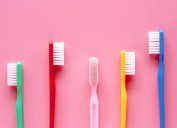7 Foods That Can Help Whiten Your Teeth Naturally, Experts Say
Pick up some of these helpful foods on your next trip to the grocery store.

A bright, white smile exudes confidence and helps you put your best face forward. But both age and the amount of coffee you drink every morning can lead to discoloration—and it can be disheartening when you feel like you can't show off your pearly whites. There are several treatments available that can remedy a discolored smile, including over-the-counter whitening strips or professional services. But if you're looking for a more natural and affordable approach to teeth whitening, you may want to consider trying out some foods that can help whiten your teeth.
"While foods themselves cannot whiten a smile, there are several that can help maintain and offer some improvements to your appearance," Sean Kutlay, DDS, cosmetic celebrity dentist, tells Best Life.
Wondering what snacks you should be adding to your grocery list? Read on to discover seven foods dentists and dietitians recommend for a dazzling smile.
RELATED: 20 Secrets for Whiter Teeth After 40.
1
Strawberries
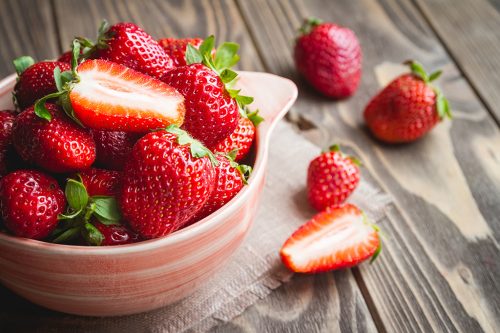
Strawberries were frequently recommended for a healthy, glowing smile.
"Strawberries contain malic acid, which can help whiten teeth," Lauren Becker, DDS at Lauren Becker Dentistry, explains.
As Kelsey Costa, MS, registered dietitian nutritionist (RDN) and health research specialist at the National Coalition on Health Care (NCHC) notes, malic acid is a "natural bleaching agent" that also increases saliva production if you have a dry mouth, which can help prevent discoloration as well.
However, don't go overboard on strawberries; they are acidic and "can wear away your enamel over time," according to Khouloud Sobh, DMD, dentist at Risas Dental and Braces in Phoenix, Arizona.
Don't like strawberries? Watermelon also contains malic acid, so you can give that a go instead.
2
Pineapple
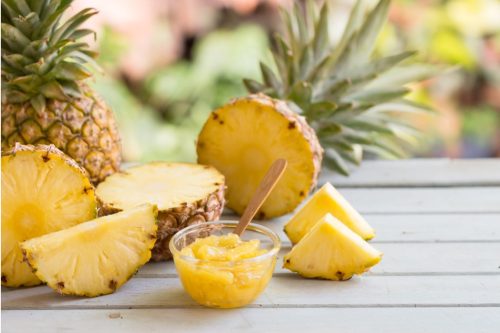
Pineapple is another fruit that can help you achieve that white smile you're looking for.
"Pineapple contains bromelain, which may break down stains on the teeth's surface," Nathan Oakes, DMD, board member at the American Academy of Clear Aligners and practice owner at Aspen Dental, tells Best Life.
According to Costa, bromelain is an enzyme that goes after proteins. "This includes the proteins in your pellicle layers (layer of salivary proteins), which acts as a protective shield for your teeth, but can also absorb pigments from your food," she says.
Madelyn Larouche, the registered dietitian (RD) behind ADHD Dietitian, mentions that you also need to get your pineapple from the fresh produce section. "It should be noted that fresh pineapple is going to have the highest bromelain content," she says. "Canned pineapple loses bromelain during the canning process."
Papaya is another bromelain-containing fruit, so you can opt for either tropical fruit based on your preferences.
RELATED: 6 Signs You Aren't Drinking Enough Water, According to Doctors.
3
Celery
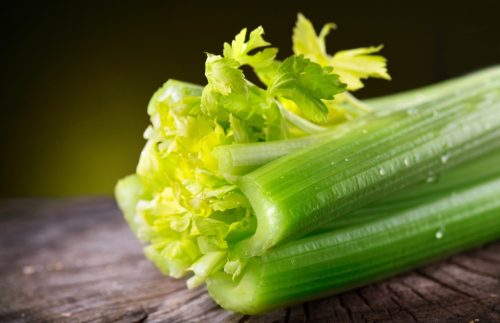
Moving on to veggies, raw celery is a tooth-friendly option for a brighter smile. Oakes notes it is a "natural abrasive that can remove surface stains" while you chew it.
"Celery is a great source of fiber and vitamins such as vitamin C and A, and the texture of this vegetable can help scrape particles and bacteria off your teeth," Sobh adds. "Just keep floss nearby, as celery can be very stringy and get caught between teeth."
Cesar Sauza, RDN at NCHC, adds that raw celery and raw cucumber are both helpful due to their levels of H2O.
"Celery and cucumber are mainly water, providing a rinse for our teeth when we chew on them," he says, noting that they're a perfect after-meal snack.
However, according to celebrity cosmetic dentist Bill Dorfman, DDS, you should proceed with caution when it comes to relying on abrasives, as they probably won't have the long-lasting effects you're looking for.
"Certain foods have a mild abrasive effect that may make teeth appear white, but they are only removing surface stains that accumulate on the surface of the teeth over time," he says. "The color of a person's teeth is determined by the natural shade of dentin, the layer beneath the enamel, and this varies from person to person based on genetics and age."
Dorfman adds that if you're also eating foods that discolor teeth—like sodas, red wine, and coffee—these crunchy foods likely won't have any effect.
4
Baking soda
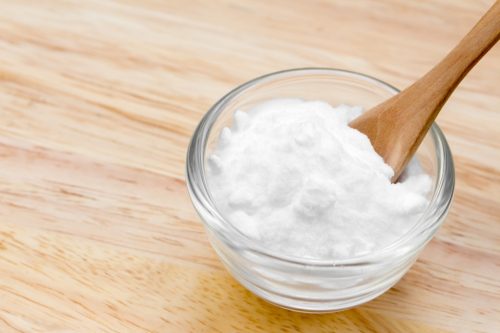
While baking soda isn't something you'd reach for as a snack, this ingredient is one of the oldest remedies for a whiter smiler—you may even notice it advertised on the toothpaste you buy.
"Baking soda has often been looked at as a natural home remedy for whitening," Becker says, also adding a word of caution. "Be careful when using baking soda, as using it too often can be abrasive on your teeth."
Still, Kutlany recommends introducing baking soda to your routine. "A small amount of baking soda mixed with toothpaste can help brighten the teeth as a semi-regular part of your oral hygiene routine," he says.
RELATED: What Happens When You Leave the Cap Off of Your Toothpaste, Dentists Say.
5
Carrots
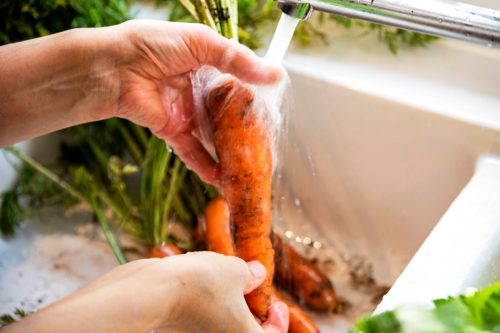
Carrots also fall under the "natural abrasive" category, meaning they can potentially aid in removing surface stains.
"Chewing on crunchy and raw carrot sticks massages your gums and helps to remove plaque and bacteria from your teeth," Sobh says. "Carrots also help strengthen your teeth's enamel by providing high amounts of vitamin A."
Jeffrey Sulitzer, DMD, chief clinical officer at SmileDirectClub, also points out that carrots' rigid texture can "help remove excess bacteria left on the teeth and gums."
Apples and leafy greens can have a similar effect, Becker says.
6
Sugar-free gum
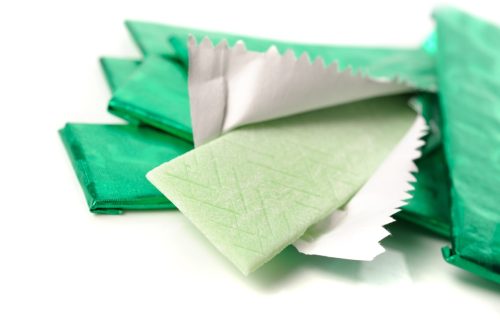
Kutlay also recommends sugar-free gum after each meal. "This helps keep the teeth clean, maintain brightness, remove any residue between teeth, and [has] the added benefit of reducing acid and cavities," he says.
Sobh has sugar-free gum on her list of helpful foods as well, citing it as a helpful alternative to floss while on the go—just don't reach for the super sweet brands.
"The gum also promotes saliva flow, which helps prevent plaque buildup and decaying of your teeth," she says. "But be advised, this only applies to sugar-free gum."
For more wellness advice delivered straight to your inbox, sign up for our daily newsletter.
7
Dairy products
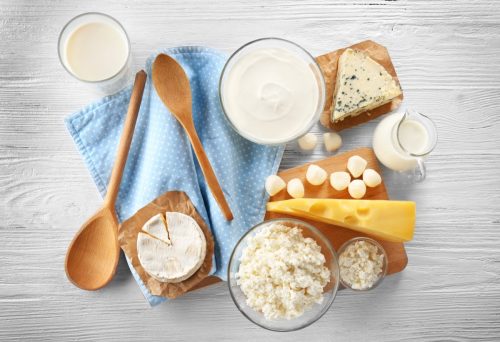
From a young age, we were taught that calcium helps support strong bones, including your teeth.
"Dairy products like cheese, yogurt, and milk provide calcium and phosphates that strengthen enamel and support remineralization, potentially reducing surface stains," Oakes explains.
Sulitzer notes that these types of foods also fight against cavities, and Larouche notes that dairy products high in lactic acid, including cottage cheese, sour cream, and Greek yogurt, are that much more beneficial.
"Lactic acid helps protect your tooth enamel, and we don't want to lose that because once it's gone, it's gone," she says. "Underneath tooth enamel is dentin, which is what stains the easiest. So by protecting your tooth enamel, you're essentially helping your teeth stay white."


